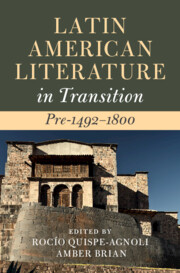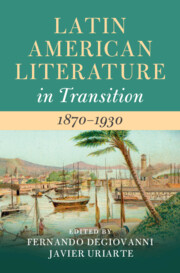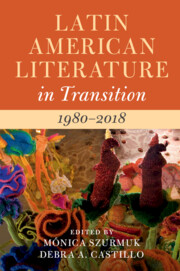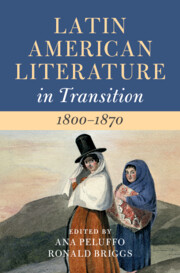Latin American Literature in Transition Pre-1492–1800
Part of Latin American Literature in Transition
- Editors:
- Rocío Quispe-Agnoli, Michigan State University
- Amber Brian, University of Iowa
- Date Published: December 2022
- availability: Available
- format: Hardback
- isbn: 9781108838832
Hardback
Other available formats:
eBook
Looking for an examination copy?
This title is not currently available for examination. However, if you are interested in the title for your course we can consider offering an examination copy. To register your interest please contact [email protected] providing details of the course you are teaching.
-
The year 1492 invokes many instances of transition in a variety of ways that intersected, overlapped, and shaped the emergence of Latin America. For the diverse Native inhabitants of the Americas as well as the people of Europe, Africa, and Asia who crossed the Atlantic and Pacific as part of the early-modern global movements, their lived experiences were defined by transitions. The Iberian territories from approximately 1492-1800 extended from what is now the US Southwest to Tierra del Fuego, and from the Iberian coasts to the Philippines and China. Built around six thematic areas that underline key processes that shaped the colonial period and its legacies – space, body, belief systems, literacies, languages, and identities – this innovative volume goes beyond the traditional European understanding of the lettered canon. It examines a range of texts including books published in Europe and the New World and manuscripts stored in repositories around the globe that represent poetry, prose, judicial proceedings, sermons, letters, grammars, and dictionaries.
Read more- Provides examples on interdisciplinary approaches to a gamut of colonial Latin American texts
- Provides readers with examples of the hemispheric, transatlantic and transpacific manifestations of colonial Latin American textual production
- Helps readers understand the broadening of materials to be studied by Discussing the notion of literature beyond the traditional European understanding of the lettered canon
Reviews & endorsements
‘… this is an outstanding collective study of the epistemological, socio-political, religious and cultural transitions that have taken place in colonial Latin America as represented in its foundational cultural discourses.’ Ignacio Lopez-Calvo, Bulletin of Spanish Studies
Customer reviews
Not yet reviewed
Be the first to review
Review was not posted due to profanity
×Product details
- Date Published: December 2022
- format: Hardback
- isbn: 9781108838832
- length: 350 pages
- dimensions: 235 x 158 x 23 mm
- weight: 0.75kg
- availability: Available
Table of Contents
Part I. Land, Space, Territory:
1. Migrations and foundations in the literature of New Spain Pablo García Loaeza
2. Defining Portuguese America: The first depictions of Brazil within the context of overseas expansion Sarissa Carneiro
3. The conquest of space in the Relación del Descubrimiento del Rio Marañon by Geronimo de Ypori (c. 1630) Yamile Silva
4. Disturbing place: Afro-Iberian herbalists interrupt imperial Cartagena de Indias Kathryn Joy McKnight
Part II. Body:
5. The Health of the Soul: Religious guidance and medical practice in early colonial Mexico Yarí Pérez Marín
6. Viceroy Valero's heart: A traveling relic, and an embodied metaphor in transit to the Indies Judith Farré Vidal
7. Humoralism and colonial subjugation: Indians and medical knowledge in the sixteenth and seventeenth centuries Germán Morong Reyes
8. Assaulted bodies: the case of two enslaved black women in the port city of Santa María de los Ángeles de Buenos Aires, 1772-1778 Mariselle Meléndez
Part III. Belief Systems:
9. The flood story in the Huarochirí Manuscript and other early colonial andean texts Soledad González Díaz
10. Idol or Martyr: Sacredness and symbol in the religiosity of the Indies Esperanza López Parada
11. Creole religiosity in colonial Mexico: Devotional cultures in transition Stephanie Kirk
12. The empire beyond Spanish America: Spanish Augustinians in the Pacific World Eva María Mehl
13. Indigenous peoples and Catholicism in eighteenth-century Mexico City Mónica Díaz
Part IV. Literacies:
14. Transcultural intertextuality in colonial Latin America Galen Brokaw
15. Becoming a book: The reproduction, falsification, and digitalization of colonial codices José Ramón Jouve-Martín
16. From print to public performance to Relaciones de fiestas: Don Quixote in viceregal festivals Eva María Valero Juan
17. Colonial Latin American bibliography and the indigenous text Clayton McCarl and Lindsay Van Tine
Part V. Languages:
18. Technologies of communication in transition: Indigenous orality and writing in colonial Mexico Kelly S. McDonough
19. A baroque arte: Horacio Carochi and the tradition of nahuatl grammars Caroline Egan
20. Acquiring a voice: the plebeians speak in early colonial Río de La Plata Loreley El Jaber
21. Knowledge in transition: Rethinking the science of sameness in Sor Juana Inés de la Cruz's New Spain Allison Margaret Bigelow
Part VI. Identities:
22. Textual figures and modalities of change: The Soldier, the Translator, the Plebeian, and the Woman Chronicler Valeria Añón
23. Diego Muñoz Camargo and the destabilization of the Relación Geográfica: adaptation and variation in the Mestizo Chronicle Héctor Costilla Martínez
24. Representing/erasing the other in colonial Brazil's eighteenth-century epic poetry Sandra Sousa.-
General Resources
Find resources associated with this title
Type Name Unlocked * Format Size Showing of
This title is supported by one or more locked resources. Access to locked resources is granted exclusively by Cambridge University Press to instructors whose faculty status has been verified. To gain access to locked resources, instructors should sign in to or register for a Cambridge user account.
Please use locked resources responsibly and exercise your professional discretion when choosing how you share these materials with your students. Other instructors may wish to use locked resources for assessment purposes and their usefulness is undermined when the source files (for example, solution manuals or test banks) are shared online or via social networks.
Supplementary resources are subject to copyright. Instructors are permitted to view, print or download these resources for use in their teaching, but may not change them or use them for commercial gain.
If you are having problems accessing these resources please contact [email protected].
Sorry, this resource is locked
Please register or sign in to request access. If you are having problems accessing these resources please email [email protected]
Register Sign in» Proceed
You are now leaving the Cambridge University Press website. Your eBook purchase and download will be completed by our partner www.ebooks.com. Please see the permission section of the www.ebooks.com catalogue page for details of the print & copy limits on our eBooks.
Continue ×Are you sure you want to delete your account?
This cannot be undone.
Thank you for your feedback which will help us improve our service.
If you requested a response, we will make sure to get back to you shortly.
×




